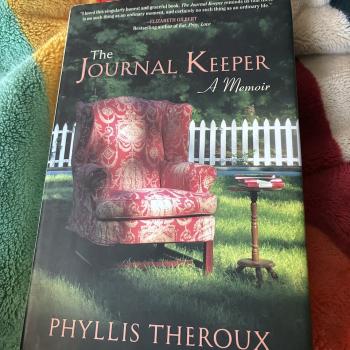Summer’s nearly here, which means that blessed season of summer reading is about to commence! As such, I’ve got someone I can’t wait for you to meet: Chris Smith is an author, an editor and a friend to many, and his new book, How the Body of Christ Talks, is a great one to add to your stack this summer. Enjoy hearing about his heart behind the book as he takes the stage on this post.

—
Hi, I’m Chris Smith and I’m delighted to write a little bit here about my new book, How the Body of Christ Talks: Recovering the Practice of Conversation in the Church. (Although everyone calls me Chris, the author name I use is C. Christopher Smith. Surely you can imagine how many million people there are in the world whose name is Chris Smith? So, I had to distinguish myself somehow from most of them. I do, however, keep a rapidly-growing album on Facebook called Books I Didn’t Write, with the covers of books by other Chris Smiths.) I live with my wife Jeni and three teenage children in the Englewood neighborhood on the Near Eastside of Indianapolis. We are a part of the Englewood Christian Church community here, a peculiar bi-lingual (English and Spanish) congregation that is both a traditional church and a community of Christ-followers who are intentionally sharing everyday life together and learning to what it means to belong to one another and to this neighborhood. I am the editor of The Englewood Review of Books, a print and online magazine that promotes habits of reading and conversation among a diverse Christian audience – and also one of about six businesses that our church has started. Some of you may be familiar with one of my earlier books, which I co-wrote with John Pattison, Slow Church: Cultivating Community in the Patient Way of Jesus. Most days, I feel really grateful to do work I love, centering around reading and writing, and grateful that this church has made this work possible for over a decade now.
In How the Body of Christ Talks, I make the case that conversation is an important corporate spiritual practice (like worship or prayer) that churches should be learning as part of their life together. Actually, more of the book is about HOW churches can initiate and sustain practices of conversation, and less about making the case that they should do so. For almost 25 years now, our church has been gathering for conversation every Sunday, and this has become of the defining practices of our life together. And as I have been writing this book over the last decade, I’ve stumbled upon a small but growing movement of churches across North America that are intentionally learning to talk together. (In a recent Christianity Today article, I briefly told the stories of four of these churches, all of which were from different denominational traditions).
The central image of the book is the human body, which exists and moves as a conversation of its diverse members. The relational life for which humanity was created by God is a life in conversation, a life in which all members of congregation are knowing and being known, and learning to collaborate for the health and stability of the church body. And, of course, learning to talk together in our churches is more of a means than an end. In a polarized world in which healthy conversation is rare, as we are learning how to talk together in our local church, we become ambassadors of God’s reconciliation that take our growing capacity for conversation into our homes, our neighborhoods, our workplaces, and even the (largely virtual) public square.
Conversation has been one of the most transformative practices for us at Englewood Christian Church; it has empowered us to start and sustain businesses, to do a lot of important work alongside our neighbors in this urban place, and to learn to share daily life together in a multitude of different ways (from sharing cars to sharing meals to sharing childcare and on and on). Our family has been part of Englewood for 16 years, and there’s lots of ways that I’ve been transformed by our habits of conversation. I write about some of the main facets of my personal transformation in the middle section of the book, which sketches a basic spirituality of conversation (or in other words, asks the question, “What kind of people are we becoming as we learn to talk together). I name three specific ways in this part of the book that I am being transformed (and I think it is fair to say that Englewood as a whole is being transformed in these ways). First, we are becoming more attentive to God’s presence with us in our conversations. As we talk with one another, we are reminded that God is with us and desires to lead us in our conversations, and so, our conversations become a way of praying together. Secondly, and perhaps the way in which I personally have been mostly deeply shaped, is that I am learning to slow down and abide in the messiness of life together. I am learning that while God does want to see the world transformed, God’s pace is often much slower than what I want, and God’s way is the way of a community of people acting together. The third and final way that I am being transformed in our conversations, is that I am learning to come prepared to our conversations. As a product of a consumer society, I’ve been formed to look for what I will GET from an activity, but the practice of preparation turns this consumer mindset on its head, asking instead what I have to GIVE, to contribute to the particular conversation that we will have.
As this last example of the importance of preparation in having healthy conversations reminds us, to learn to practice conversation in a world that has little or no capacity for talking together is to color outside the lines. Many of us have a deep sense of the brokenness of the world we live in – the injustices of gender, race, sexuality, ethnicity, and class, for instance – and yet have very few settings in which we are able to sustain conversations with people whose identity or convictions are distinctly different than our own and to talk and to imagine together how God might be beginning to heal these wounds in creation. We often want to see the world changed, but don’t want to have to be changed ourselves. In conversation, we learn that none of us is exempt from God’s transformative work. God loves all humanity, even those who identify themselves as enemies of God, and the way of God’s healing embraces all humanity across every divide that separates us. Conversation creates a space in which we are learning to be faithful to God’s way, not trying to punish those who disagree with us, but rather to move toward reconciliation and toward finding ways that we can agree to work together, however small they might be. Conversation is ultimately a way of hope for me, in which we get glimpses that the love and justice of Jesus might eventually prevail on earth as it is in heaven!

In addition to the links I’ve included above, you can find me online at C-Christopher-Smith.com, as well as on Facebook and Twitter.
—
Y’all, Chris Smith is the real deal. I’ve loved getting to write for him over the last couple of years, and am delighted to cheer on his latest book. Be sure to pick up a copy of How the Body of Christ Talks if you haven’t already, and otherwise, leave a comment for our friend here.
*Post contains Amazon Affiliate links












